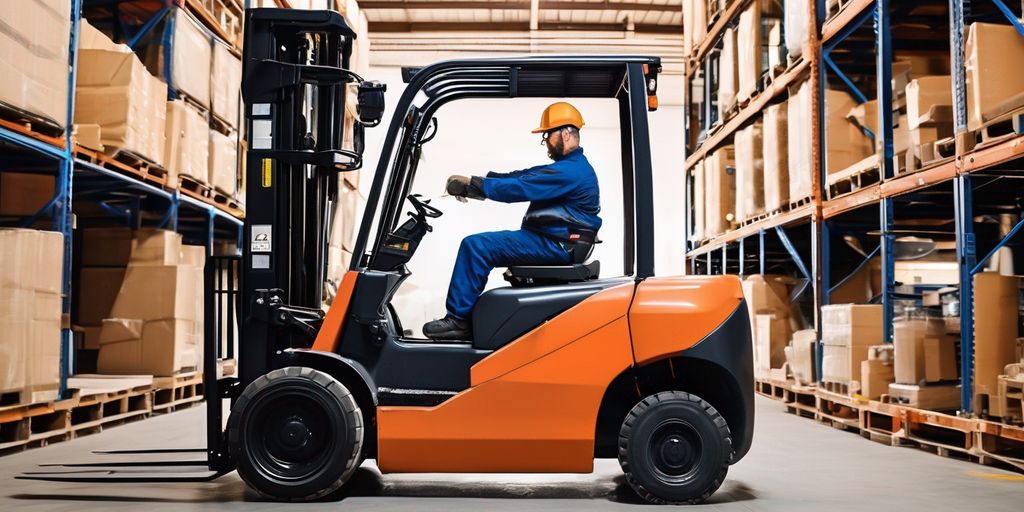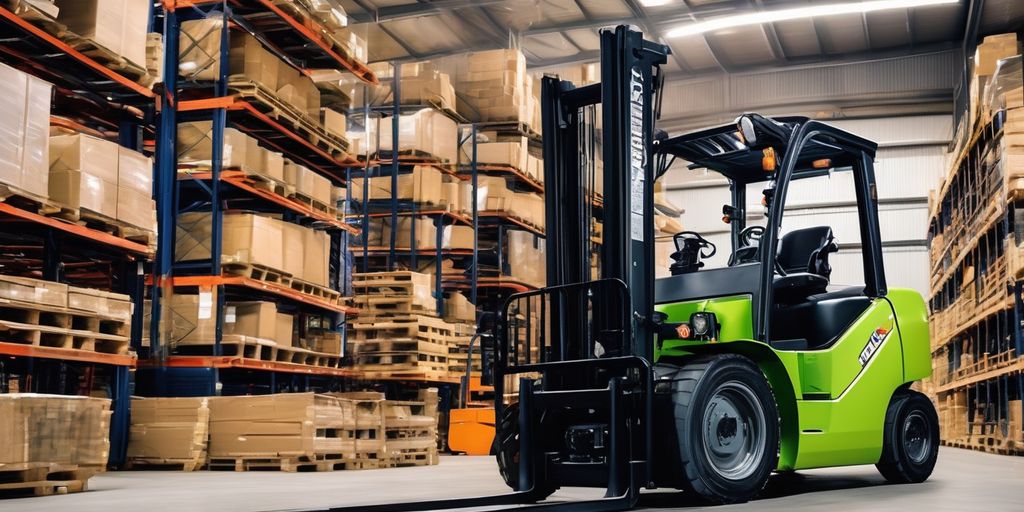How to Choose the Best Forklift for Sale: A Comprehensive Guide — overview
Choosing the right forklift for your business can be a challenging task, given the myriad of options available in the market. From understanding your operational needs to evaluating different types of forklifts and their fuel options, there are several factors to consider. This comprehensive guide aims to simplify the process, providing you with essential insights and practical advice to help you make an informed decision.
Key Takeaways
- Assess your business requirements thoroughly to determine the type of forklift that best suits your operational needs.
- Understand the different types of forklifts available, such as counterbalance forklifts, reach trucks, and order pickers, and their specific applications.
- Consider the various fuel options, including electric, diesel, and LPG forklifts, and choose one that aligns with your business's operational and environmental goals.
- Pay close attention to key features such as safety, ergonomics, and technology integration when selecting a forklift.
- Weigh the pros and cons of purchasing a new versus a used forklift, taking into account factors like cost, maintenance, and warranty options.
Assessing Your Business Requirements
When choosing the best forklift for your business, it's crucial to assess your overall business requirements to ensure the forklift meets your operational needs. This involves understanding the specific tasks you'll be using the forklift for, the types of materials you'll be handling, and the typical working conditions at your facility.
Types of Forklifts and Their Applications
Choosing the right forklift for your operations is crucial for efficiency and safety. Understanding forklift classifications can help you narrow down your options and make an informed decision.
Counterbalance Forklifts
Counterbalance forklifts are widely used in various industries due to their versatility. They offer lifting capacities ranging from small loads to large pallets. These forklifts are adept at general pallet moving and are often seen in smaller to medium-sized warehouses. For instance, a beverage distribution center might use them for loading and unloading pallets of drinks from delivery trucks and moving them to storage areas.
Reach Trucks
Reach trucks are designed for high stacking and are ideal for warehouses with tall storage racks. They have an extended reach capability, allowing them to access goods at greater heights. This makes them perfect for operations that require efficient use of vertical space.
Order Pickers
Order pickers are specialized forklifts used for picking individual items from warehouse shelves. They are commonly used in distribution centers and e-commerce warehouses where picking efficiency is paramount. These forklifts allow operators to be lifted to the height of the storage rack, making it easier to retrieve items without the need for ladders or other equipment.
By understanding your specific application requirements, you can select a forklift that is optimized for the tasks at hand.
Fuel Options for Forklifts
When choosing a forklift, one of the most important factors to consider is the fuel type. Each fuel type has its own advantages and disadvantages, and choosing the right one can greatly impact the efficiency and cost-effectiveness of your operation. In this section, we will discuss the different fuel types available for forklifts and their respective efficiencies.
Key Features to Look for in a Forklift
When purchasing a forklift, it's essential to consider several key features to ensure you select the best equipment for your needs. Understanding these features can significantly impact your operational efficiency and safety.
New vs. Used Forklifts: Pros and Cons
When it comes to acquiring a forklift for your business, one of the most important decisions you’ll face is whether to invest in a new or used model. Both options have their pros and cons, and understanding these differences is essential in determining the best choice for your specific needs.
Advantages of New Forklifts
New forklifts typically come with a higher price tag, but they also often include warranty coverage and financing options. A new forklift is likely to offer better reliability and performance, as it comes with the latest features and technology. This can lead to increased productivity and safety in the workplace.
Benefits of Used Forklifts
Used forklifts, on the other hand, are generally more affordable upfront but may not include the same benefits. However, a well-maintained used forklift can still provide dependable service at a lower cost, making it an attractive option for some businesses. Be sure to factor in the potential costs of maintaining a used forklift when making your decision.
Cost Considerations
| Factor | New Forklifts | Used Forklifts |
|---|---|---|
| Initial Cost | Higher | Lower |
| Warranty | Often included | Rarely included |
| Financing Options | Available | Limited |
| Maintenance Costs | Lower initially | Potentially higher |
The decision depends on your budget and operational needs. New forklifts come with the latest features and warranties, while used forklifts are more affordable but may require more maintenance.
Maintenance and Warranty Considerations

Regular maintenance is essential to ensure the longevity and safety of the forklift. Maintenance and repairs are an inevitable part of owning a forklift. It is important to factor in the cost of maintenance and repairs when deciding which forklift to purchase. Electric forklifts have lower maintenance costs than internal combustion forklifts because they have fewer moving parts and require less maintenance.
When choosing a forklift, warranty and dealer support are important considerations. A warranty ensures that you are covered in case of any issues that may arise with your forklift. Some dealers provide limited warranty support, while others provide more comprehensive coverage. It is worth having this information in mind when purchasing a forklift.
The importance of dealer support and service cannot be overstated; look for good warranty options, availability of spare parts, and a reputable dealer. New forklifts typically come with a manufacturer’s warranty, offering peace of mind and protection against unexpected costs. Used forklifts may not have this coverage, or it may be more limited. It’s essential to consider the level of support and warranty coverage you require when deciding between a new or used forklift.
Making the Final Decision
When it comes to choosing the right forklift, there are several key considerations for your business needs. This guide will help you select the optimal forklift based on your specific requirements and the types of forklifts available.
Comparing Different Models
Before making a final decision, it's crucial to compare different forklift models. Evaluate their ergonomics, maneuverability, operator comfort, and other features that are important for your specific operations. This hands-on evaluation can provide valuable insights to inform your choice.
Consulting with Experts
Consulting with experts can provide you with the proper knowledge to get the best forklift for your needs. Experts can offer advice on the latest models, features, and technologies that might be beneficial for your operations.
Test Driving Forklifts
If possible, arrange to test different forklift models before making a final decision. This practical evaluation will help you understand how each model performs in real-world conditions, ensuring you make an informed choice.
In summary, when choosing a forklift, consider the initial purchase price, maintenance and repair costs, and fuel consumption to make an informed decision.
Conclusion
Choosing the right forklift is a critical decision that can significantly impact your business's efficiency and productivity. This comprehensive guide has walked you through the essential factors to consider, from understanding your specific needs and evaluating different types of forklifts to considering fuel options, load capacities, and whether to buy new or used. By taking the time to thoroughly assess your requirements and explore your options, you can make an informed decision that aligns with your operational goals. Remember, the right forklift is not just a piece of equipment; it's a valuable asset that can enhance your business operations for years to come.
Frequently Asked Questions
What factors should I consider when choosing a forklift?
When choosing a forklift, consider factors such as your operational needs, warehouse layout, load capacity requirements, and the type of fuel that best suits your business.
What are the different types of forklifts available?
Common types of forklifts include counterbalance forklifts, reach trucks, and order pickers. Each type is designed for specific applications and operational environments.
What are the advantages of electric forklifts?
Electric forklifts are environmentally friendly, produce zero emissions, and are quieter compared to diesel or LPG forklifts. They are ideal for indoor use and require less maintenance.
Should I buy a new or used forklift?
The decision to buy a new or used forklift depends on your budget, usage requirements, and long-term plans. New forklifts come with the latest features and warranties, while used forklifts are more cost-effective.
What safety features should I look for in a forklift?
Important safety features to look for include stability control, ergonomic design, visibility aids, and advanced braking systems. These features help ensure the safety of operators and workers.
How important is routine maintenance for forklifts?
Routine maintenance is crucial for the longevity and efficiency of forklifts. Regular checks and servicing help prevent breakdowns, ensure safety, and maintain optimal performance.




Leave a comment
This site is protected by hCaptcha and the hCaptcha Privacy Policy and Terms of Service apply.